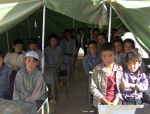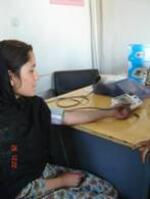‘Culture’ is one of the most understudied dimensions of resilience as a pathway to health. Our program examines resilience across cultures, integrating qualitative and quantitative research to connect the dots between cultural values, socio-political structures, family-level resilience, and individual health outcomes. Research projects in Afghanistan, Jordan, and Sierra Leone focus specifically on family-level resilience.
Examples of projects
 Resilience: Conceptualization for Research and Policy
Resilience: Conceptualization for Research and Policy
This work draws together work from academia and humanitarian practice and policy, to help define and operationalize resilience.
See policy brief here and abstract here
Child and Youth Resilience Scale 
We developed and validated the Arabic-language Child and Youth Resilience Measured (CYRM) with Syrian refugee and Jordanian youth. This study was led by Panter-Brick, Hadfield, Dajani, Eggerman, Ager & Ungar.
More information here: https://pubmed.ncbi.nlm.nih.gov/28617937/.
 Resilience and Mental Health in Afghanistan
Resilience and Mental Health in Afghanistan
Eggerman and Panter-Brick led the first longitudinal survey of child and adolescent mental health in Afghanistan. This project integrated cross-cultural psychiatric epidemiology with medical anthropology to provide evidence on mental health and resilience across generations. More information here:
https://pubmed.ncbi.nlm.nih.gov/25384553/
https://pubmed.ncbi.nlm.nih.gov/24286507/
https://pubmed.ncbi.nlm.nih.gov/21421175/
https://pubmed.ncbi.nlm.nih.gov/19699514/
https://pubmed.ncbi.nlm.nih.gov/18663740/
 An Ethnographic Study of Father-Child Interactions & Child Development in Sierra Leone
An Ethnographic Study of Father-Child Interactions & Child Development in Sierra Leone
This ethnographic study, led by Kristen McLean, showed how men engage with children in the aftermath of conflict and Ebola, providing evidence on local family dynamics and wellbeing. For the Harvard program, please see: https://fxb.harvard.edu/former-programs/
 Mental health, psychosocial distress, and stress biomarkers
Mental health, psychosocial distress, and stress biomarkers
Sancilio, Eggerman, Rasmussen, Ventevogel, and Panter-Brick compared the extent to which individual stress physiology mapped onto local and international mental health screening instruments. More information here:
See https://pubmed.ncbi.nlm.nih.gov/27435220/
https://pubmed.ncbi.nlm.nih.gov/25034331

